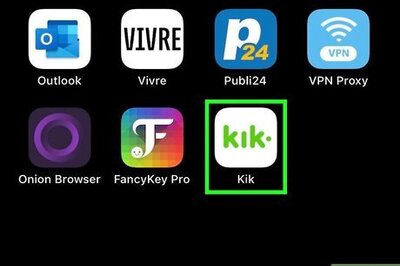
views
X
Trustworthy Source
Greater Good Magazine
Journal published by UC Berkeley's Greater Good Science Center, which uses scientific research to promote happier living
Go to source
But, with good communication and a lot of patience and empathy, you can help your anxious SO and work together to have a healthy, secure relationship.
Positivity and Trust

Express gratitude for the good things your partner does. One great way to help your sweetheart heal and feel more secure is to let them know how much you appreciate them! If they do something you like, even if it’s something really small, don’t hold back—tell them how great it makes you feel. You could say something like, “Thanks so much for listening to me vent about work this afternoon. It made me feel so much better,” or “Wow, that dinner you cooked was amazing. I really appreciate you taking the time to do that.” You can even thank them for just being there. For example, “Seeing you every night is the highlight of my entire day. Thanks for being you!”

Reassure your partner about your feelings often. When someone has anxiety attachment, they fear rejection and constantly worry that the people they love don’t love them back. Even if it seems obvious to you, make an extra effort to tell them just how much you care. Try to say “I love you” at least once a day—it only takes a few seconds! If saying “I love you” is hard for you, or if you’re not quite there yet in the relationship, try things like “You mean so much to me” or “It feels so great to spend time with you.” You can also show them how you feel by doing things like giving them gifts, leaving little notes for them to find, or offering to help them out without being asked. Don’t forget about physical signs of affection—you can say a lot with a smile, a kiss, a hug, or a shoulder rub!

Be consistent and follow through on your promises to encourage trust. Trust can be hard for someone with attachment anxiety. No matter how much you tell your partner you love them, they might have a hard time believing it. To build up trust in your relationship, be consistent and make sure that your actions match your words. For example, if you say you’ll meet your partner at a certain time, make sure to be there. If you get held up, call them and explain what’s going on. Avoid ghosting your partner for long periods of time. If you know you won't be able to reply to a text for several hours or days, let them know what to expect ahead of time.

Encourage them to chase their own goals and interests. Deep down, attachment anxiety comes from a lack of self-confidence. While you can’t actually make your bae feel better about themselves, you can help them heal and support them in setting their own goals and encourage them to follow their dreams. As they start to get more excited about things outside the relationship, you might just see a positive difference in the relationship! For instance, if you know they’re the artistic type, urge them to sign up for a painting class. The process of learning and creating might give them a boost of confidence, plus they’ll feel good knowing that you support their passions.

Ask what you can do to help them feel better. Asking how you can help is a good way to reassure your anxious SO that you care about their needs. It will also give you a better sense of what they’re worried about. Say something like, “I know you feel anxious and uncertain about where things stand with us. What can I do to help put your mind at ease?” Listen carefully to what they have to say, and don’t be afraid to ask questions if you need them to clarify something. For example, “It sounds like you want me to be better about remembering to ask you about your day. Is that right?”
Empathy and Understanding

Ask your partner to explain their fears. If your partner seems clingy, jealous, or quick to assume the worst about what you’re doing, resist the urge to get defensive. Instead, ask some gentle questions to help you—and them—understand what’s at the root of their insecurity and what some of the big triggers are for their anxiety. Encourage them to explain what they’re afraid of and where those fears are coming from. For example, say something like: “What are you worried will happen when I’m out with my friends?” or “Why does it bother you so much when I don’t pick up the phone at work?” Use a gentle, encouraging tone and pick your words carefully so it doesn’t sound like you’re belittling their fears or making accusations. Avoid saying things like, “Why can’t you just stop worrying about it?” or “What’s the big deal?” Talking to them about their feelings in a gentle way might help them become more self-aware, which is an important part of managing attachment anxiety.

Try to imagine yourself in your significant other’s shoes. Empathy is really important in any relationship. If you’re bothered by your SO’s anxious behavior, stop and think about how things might look from their perspective. At the same time, allow yourself to feel a little bit of what they might be feeling. Once you understand them a little better, it might be easier for you to react in a constructive way. For instance, maybe they’re upset that you didn’t ask them how their day went. You might think to yourself, “I can see how that might make it seem like I don’t care, even if I didn’t mean it that way. That must hurt.”

Let them know that their feelings are valid, even if you disagree. Instead of trying to “fix” your partner’s fears or tell them that there’s nothing to worry about, let them know that you recognize their emotions. That doesn’t mean you have to agree with their reasons for feeling anxious! Just acknowledge how they feel and that they have a right to feel that way. For example, say something like, “I know you get really anxious and upset when I go out and you don’t hear from me for a while, because you’re not sure what’s going on. That uncertainty must be scary.”

Use the ATTUNE technique to keep arguments from escalating. Arguments are a fact of life in relationships, but they can be extra stressful if your partner has attachment anxiety. To keep your SO from feeling overwhelmed or worrying that you’re about to dump them, remember to use the ATTUNE method. This will help them feel heard and understood. ATTUNE stands for: Aware: Pay attention and be mindful of what they might be feeling. Turn: Physically turn toward them and make eye contact, which shows you are engaged and not tuning them out. Tolerate: Be tolerant of how they express their feelings, even if you don’t completely agree. Of course, this doesn’t mean you have to put up with violent or abusive behavior! Understand: Do your best to put yourself in their shoes and see where they’re coming from. Non-defensive language: As hard as this is, try not to get defensive. Instead, acknowledge your part in the conflict (e.g., “You’re right, I don’t always remember to ask you how your day went.”). Empathy: In addition to trying to understand their point of view, do your best to connect with their feelings. For example, “That must feel really hurtful and frustrating.”

Read up on attachment theory to understand your partner’s behavior. If you’ve never dated someone with an anxious attachment style, it might be hard to understand where they’re coming from. If you’re struggling in the relationship but really want to make it work, read books and articles about attachment theory so you can get a deeper perspective on what your special someone is going through. It might help you understand your own attachment style a little better, too! For an in-depth look at attachment theory, check out books like Attached by Amir Levin and Rachel Heller You can also look at articles like this one that explore how childhood experiences shape adult relationships: https://www.helpguide.org/articles/relationships-communication/attachment-and-adult-relationships.htm
Healthy Boundaries

State your needs and expectations clearly to your partner. If you get too wrapped up in your partner’s emotional needs and anxieties, it can be easy to forget about your own! If there’s something you need in the relationship, don’t hesitate to let them know. Be specific and clear, while at the same time reassuring them that you still care about their own wants and needs. For instance, say something like, “Hey, I work an extra-long shift on Wednesdays, and I just don’t have the energy for a long phone call in the evening. I know you really want to talk, and so do I, but can we catch up on Thursday night instead?” Be mindful of your tone and the words you use, since anxious attaches can sometimes over-analyze what you say and get the wrong impression. Keep your voice calm and gentle, and avoid any language that might sound accusatory or blaming. Stick to “I” statements, like “I just need a little time to unwind alone sometimes.” Avoid “you” statements, such as “You’re always bothering me when I’m trying to relax.”

Work with your partner to find solutions when problems come up. Sometimes, making a relationship work requires a little negotiation and problem-solving. If your partner is having a hard time dealing with your expectations or meeting your needs, sit down and brainstorm with them about how to solve the problem. Let them know that you want to work together as a team to make things better for both of you. For example, you could say, “I know you get lonely when I’m at work, but I can’t keep answering texts and phone calls while I’m on the clock. What if I make a point of calling you during my lunch break?” Try to have the conversation at a time when you’re both feeling calm and relaxed—that way, it’s less likely to turn into an argument!

Give your partner gentle reminders if they cross your boundaries. No matter how good their intentions are, your SO is probably going to slip up and cross the line at some point. If it happens, don’t be too quick to get mad or write them off. Instead, patiently remind them of what you talked about and why it’s so important to you that they respect your wishes. Try saying something like, “Hey, remember how we agreed not to talk about my ex anymore? Let’s just focus on what you and I have together now—I think it’s pretty special!” Of course, if your partner consistently crosses your boundaries or refuses to even try to respect them, that’s a serious problem! If that happens, it might be time to look into couples counseling or even end the relationship.

Make time to do things for yourself outside the relationship. Dealing with attachment anxiety in a relationship can be really tough. Make sure to take care of yourself and do things that are important to you so that you don’t get too overwhelmed. After all, you’ll be a better partner for your SO if you’re happy, secure, and self-confident! Set aside time to do things like: Doing hobbies you enjoy Spending time with friends and family outside your relationship Taking care of your physical needs, like getting exercise and sleep Working on goals that are important to you, such as finishing school or getting a better job

Discuss getting therapy if their anxiety is causing major problems. Attachment anxiety is no joke, and sometimes it can cause serious problems in a romantic relationship. If you’re committed to making things work, but you and your partner just can’t seem to get along, encourage them to see a therapist—either with you or on their own. Explain that you really want to stay with them, but you think that your relationship could be a lot stronger if you got a little outside help. The good news is that it’s totally possible to build a healthy relationship, even if one or both of you struggles with attachment issues. A good therapist can help you find ways to build trust and intimacy and develop a more secure bond by working together. Your partner may also benefit from seeing a therapist on their own, but that’s ultimately up to them. You can gently encourage them to get help and even recommend specific counselors or psychologists, but don’t try to force them into it.



















Comments
0 comment